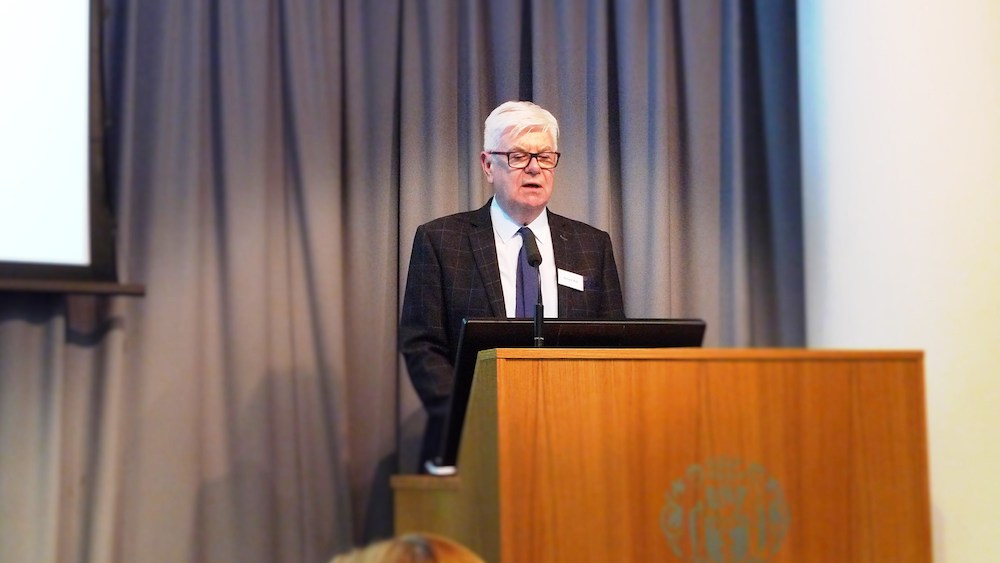
AT-Autism Adviser Richard Mills
Behaviours that challenge. Does official guidance change practice?
AT-Autism seminar at the Royal Society for Medicine on 16 December 2016
We were delighted to welcome friends and colleagues from around Europe to London for our free seminar at the prestigious Royal Society of Medicine. Delegates arrived from Greece, Malta, Denmark, Ireland, Guernsey, Jersey and all parts of the UK. A wide number of autism and learning disability organisations and local authorities were represented. Dr Ian Ragan, representing the National Autism Plan was also present. Sadly, a rail strike meant that some delegates from areas South of London were unable to make the journey. Sudden illness also meant that one of our chairs; Helen Ellis and speaker Dr Michael McCreadie were indisposed. We were grateful to AT-Autism directors Chris Atkins and Linda Woodcock for stepping in.
AT-Autism Adviser Richard Mills opened the day by welcoming delegates and asking them to think about key messages as to what might help national guidance work at a local level. He reminded delegates that these were tough issues that had been around for many years and that no simple solutions existed. As an author of one of the very first policy documents ‘the Yellow Book’, written over 20 years ago it would be naïve to think that solutions were easy and that merely issuing guidance would resolve the issue. Challenging behaviours render individuals and families vulnerable and continue to be one of the major stressors concerning future security for families. They carried a high social and economic cost. The scandal of Winterbourne View Hospital and other cases of abuse confirmed the ongoing challenge.
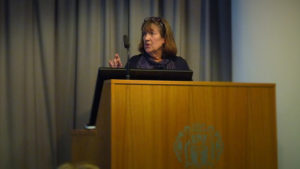
Prof Glynis Murphy
Opening keynote speaker Professor Glynis Murphy of the Tizard Centre and Chair of the NICE Guidance described the thorough
and painstaking process involved in producing guidelines for the National Institute for Health and Care Excellence (NICE) and offered insights into what the NICE terminology meant. She outlined the complexities of producing an evidence-based guideline and how only evidence meeting the highest standards was permitted. This was a difficulty in areas where there was little research such as learning disabilities but the widely representative nature of the guideline development group and the admittance of some case studies meant that the guidance did reflect real world settings – even though it is mainly permissive. Guidance does make some clear recommendations such as supporting families and around annual health checks but there is little that is prescriptive. Discussion emphasised the importance of NICE in developing good practice and helping to prevent poor practice and delegate Dr Carole Buckley, the RCGP autism champion was able to explain the initiative around the Royal College of GP’s and work on improving training, awareness and practice.
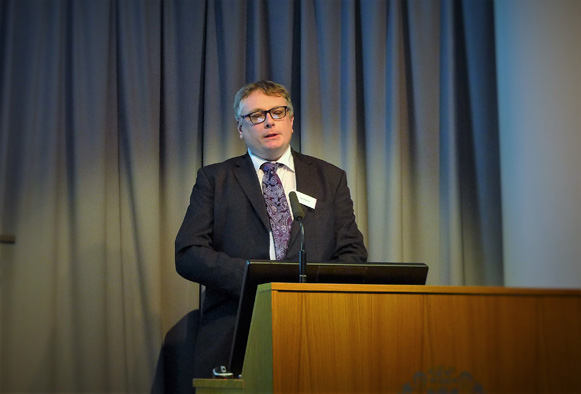
Joe Powell
The second speaker, Joe Powell spent many years in the care system and experienced various models of care and support. Joe is now the Director of All Wales People First, a self-advocacy organisation. Joe’s entertaining and insightful talk described his years in health and social care and how the attitudes and values of staff and the culture of the organisation were so potent in determining the nature of services and the quality of support. Joe was also able to shed light on a seldom addressed area i.e. the lived experience of the service user in services for people with the label ‘challenging behaviour’. He was able to share many examples of a life lived in services, such as being unable to choose where to live or who you lived with and of the stress of living alongside challenging behaviour and dysfunctional staff in a culture that did not appear to listen. Joe spoke candidly about his own issues with anger and self-confidence and how, through self-advocacy and the support of a mentor he was able to become independent. Joe’s first-hand experience of living in services should help form the blueprint for future design and operation.
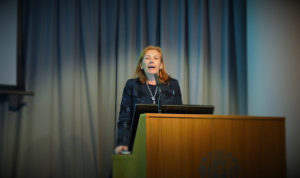
Dr Juli Crocombe
Consultant psychiatrist, Dr Juli Crocombe was able to relate her long clinical experience of working in secure settings where people were often admitted as a last resort and of the uses and abuses of medication. As one of the leads of the Royal College of Psychiatrists Juli is able to influence policy and is making it a priority to develop a greater understanding by her colleagues of the underlying issues that need proper investigation and intervention in order to avoid the use of medication. Juli is now working with the charity Caudwell Children in their new autism resource. One of her main roles will be to ensure that early identification and intervention in the form of better understanding by parents and professionals is a key to limiting the use of medications to those conditions where it is a first choice approach. Autistic children and adults were often on antipsychotic medication for years without any obvious benefit and with potential harms. Medication should always be kept under proper review and stopped if there is no clear evidence of benefit. Too often doctors are under pressure from relatives or staff to persist with medication due to a lack of available alternatives.
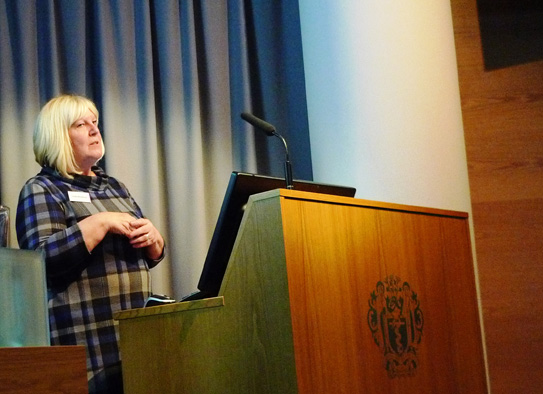
Linda Woodcock
Our final speaker, AT-Autism director Linda Woodcock spoke with knowledge and passion about the need to personalise services, especially for those people seen as ‘complex’. She spoke from professional experience having worked extensively with families but also in a highly personal capacity, having been forced to move her own autistic son from an expensive provision where staff was paid minimum wage and where there was a high turnover and a poor level of care. He had been found his own home close to the family with his own dedicated staff team. Here he has progressed free of the stress of living with other people, many of whom were ‘challenging’. Linda spoke of the importance of really knowing the person well and playing to their strengths and preferences, and avoiding those issues known to be problematic. This approach was more likely to ensure their quality of life was meaningful and as free of known stressors as possible. Linda also emphasised the importance of being a good employer – of looking after staff to ensure they were properly trained, supported and valued. This model is too often in stark contrast to what is found in practice, where the effect of cuts may mean low staff numbers and morale or those services which describe themselves as ‘specialist’ but may be motivated more through profit than ensuring a good quality of life – In Linda’s words ‘some specialist provision is not that special.
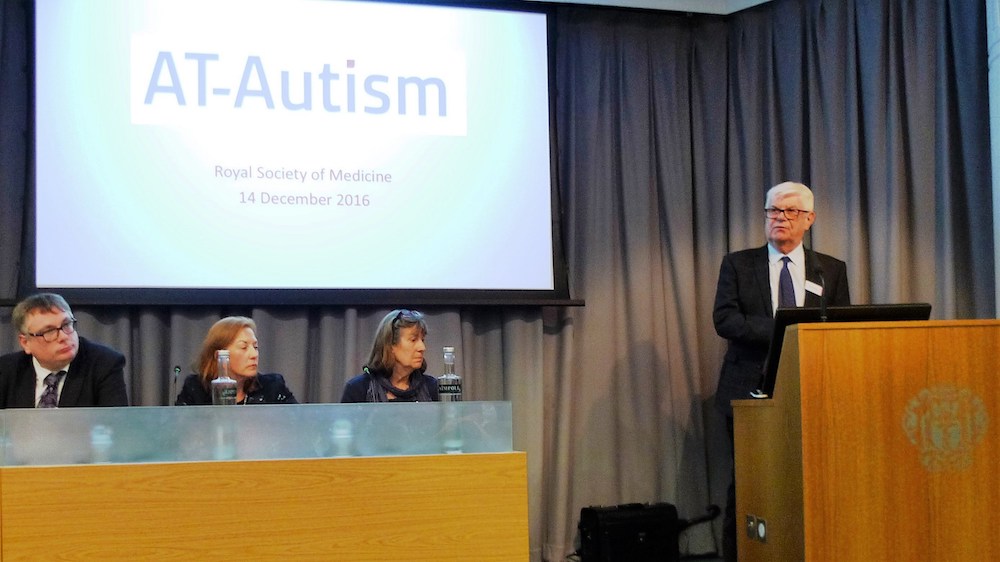
Richard Mills Closing Remarks
A lively discussion covered issues such as the usefulness or otherwise of behaviour support plans (and how having any plan, even one that avoided rigid planning was in fact a plan) ; the importance of promoting happiness and reducing stress ;addressing the negative and risk averse mind-sets in promoting a different narrative around disability.
Local differences were flagged up highlighting the impact of ‘postcode lottery’ that exists in the UK and which leads to people being passed between agencies often getting no help. Other countries, where there is a more integrated model of health and social care still struggle with issues around training and local capacity. Models to support and expand local capacity were needed. Concluding comments from the chairs reflected that ignorance was often not the issue as we often did know what to do but still failed to do it. Inexplicably, the same mistakes kept being made. Why was this? Themes to emerge included promoting physical health, happiness and wellbeing, the importance of planning in reducing risk and harmful stress, the need to care for staff and ensure proper training and support and the need for a more respectful and listening response where the those who used services were valued and protected and their views were acted on.
Finally, our thanks to Jacky Towells for her outstanding organisation, the chairs and speakers and to Georgia and her team from University College London for their support with the logistics on the day, the staff of the RSM and to all delegates for travelling to London and giving us their support.
We hope to see everyone in Athens for Synergy 17 conference on 10 and 11 October 2017
Board AT-Autism 17 December 2016
